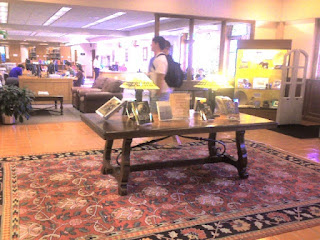I wrote this piece for the library newsletter,
OlinInfo. Since we don't print too many copies of OlinInfo I thought it might get a few more readers if I published it here. As far as I am concerned, the more people who know about Ranganathan the better.
Books that made a difference: S. R. Ranganathan’s “The Five Laws of Library Science.”How can a book with such a boring title have changed my life?
To answer this question we have to go back to a small Christian hostel called
Hephzibah House in New York City in the summer of 1989. (Why Hephzibah? Well, that is another
book, specifically
Isaiah 62:4.) Now, I am no Christian but if you are looking for a cheap bed in NYC this place can’t be beat. It is still there. Anyway, there I was in NYC thinking about my future. I was managing bookstores and going nowhere in Rochester, NY while my wife Bethany had found her bliss (Oops! Another book, see
Joseph Campbell’s The Power of Myth) as a graduate student of modernist poetry. I had a copy of
What Color is Your Parachute a book that had changed many peoples’ lives but it didn’t much help me. But it was there that I decided to become a librarian.
One of the assignments in my first course in Library School required that I read one of the classics of librarianship. Being an ornery foreigner, I didn’t want to read one of the predictable Anglo librarians –
Melvil Dewey,
Charles Ammi Cutter,
Verner Clapp,
Michael Buckland, etc. Instead I decided to hunt down an Indian mathematician and father of Indian librarianship who was just mentioned briefly in my textbook --
Shiyali Ramamrita Ranganathan and his book
The Five laws of Library Science.
My
professor encouraged me, relieved not to have to read another summary of Dewey’s
Decimal Classification and Relativ Index. So I hunted down a 1931 edition published in India in English owned by the
Buffalo and Erie County Public Library. A small book printed on cheap paper and bound in blue cloth, it felt like a visitor from the past in my hands. Opening it I found the seal of the publisher, the Madras Library Association, with their wonderful motto, “To Be Literate is to Possess the Cow of Plenty.”
The book is a strange mixture of a philosophy of librarianship and a manual of library operations, liberally sprinkled with anecdotes about libraries. The core of the book consists of Ranganathan’s five laws:
1. Books are for use.
2. Every reader his or her book.
3. Every book its reader.
4. Save the time of the reader.
5. The library is a growing organism.
I knew as I read them that I had found my bliss. Each one is so simple and yet perfectly encapsulates an aspect of my chosen career, my vocation. Nowadays we may talk of information resources instead of books, just one information format amongst many that librarians deal with, but the laws still ring true. The first law boldly states that books are for use. Not to be adored as objects, not to be preserved, untouched, but for use now and into the future. The second and third laws stress that use is not amorphous but particular. Every reader is in pursuit of a particular book and each book satisfies a particular need. The fourth is one librarians break constantly by placing barriers between the reader and the information they seek and we must constantly work to remove those barriers and save the time of the reader. Finally, we must remember that a library is not, as Nicholson Baker in
Double Fold might have thought, a museum or a closed archive. It is a growing organism with information added and taken away constantly and with new services designed to meet the new needs of new users. Libraries are a product of the societies that nourish or neglect them and as those societies change so does the library.

